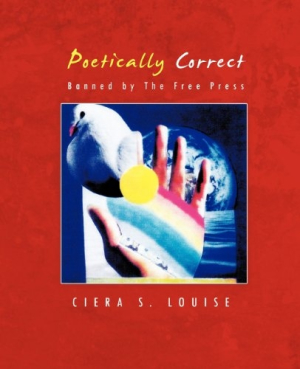Poetically Correct
Banned by the Free Press
What is politically correct or incorrect depends upon the audience and society as a whole. Ciera S. Louise’s poetry collection, Poetically Correct, is full of bold poems that critique the skeletons in humanity’s closet. Spanning eight years, December 23, 2003, to April 2, 2011, the poems touch on censorship, bullying, and both personal and political wars.
Louise marries poetry and politics in her tongue-in-cheek title. Many of the poems are shaped into single-stanza forms that slink down the page like scrolls, which fits the politically charged subject matter. “A-Z Mysteries” takes on the abecedarian poetic form and walks the reader through the alphabet asking rhetorical questions about life and justice and “insensitive judges.”
Like Dr. Seuss, Louise’s rhymes are clever and cutting. For example, “Rhapsody of Addiction” opens with the couplet: “My cigarette was like a tortoise / Who should have been named Rigor Mortis.”
Especially moving poems in this collection are those that focus on a central and vivid image or point. For example, “An Old Woman in New England” opens with an emotionally moving image: “fractured vase now stands alone.” The personified vase asks that it not be glued back together because “I shan’t hold water anyway.” Loss and aging shine through such vivid descriptions.
There are times when the politics is turned up so high that the lyricism is drowned out. For example, in “Someone Cut the Line,” Louise writes, “I’m that dirty snowbank / Ignored in this life.” In “Oppressive Press,” the smart rhymes are replaced by righteous anger about a press that misinforms the public. The poem ends on an all-too-loud exclamation: “Democracy not dictatorship / Shall see The People through!” The blunt ending doesn’t ring as authentic as the more lyrical and witty poems in the collection.
With Poetically Correct, Louise declares that “poets defined this country.” She does not believe that truth is found in newspapers or politicians’ speeches. Instead, Louise points to poetry as society’s truth teller. She asks the reader to consider human behavior, the impact of silence, and what freedom really means. This is a chance, as Louise writes in “Time After Time,” to turn away from the “Book of lies” because “He who imitates surely dies.”
Reviewed by
Lisa Bower
Disclosure: This article is not an endorsement, but a review. The publisher of this book provided free copies of the book and paid a small fee to have their book reviewed by a professional reviewer. Foreword Reviews and Clarion Reviews make no guarantee that the publisher will receive a positive review. Foreword Magazine, Inc. is disclosing this in accordance with the Federal Trade Commission’s 16 CFR, Part 255.

